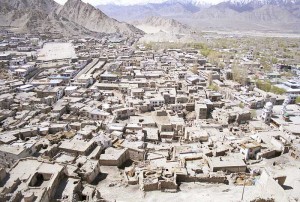
Source: Wikipedia (Pipimaru)
In June 2014 a conference will take place in Leh (Ladahk Region, India) with a focus on sustainable resource development in the Himalayas. The conference is being organised by the Geological Society of London, in collaboration with the Institute of Energy Research and Training at the University of Jammu, India and many other stakeholders. It will examine a range of issues, including geohazards, access to clean water, geotourism and others.
Prior to the main conference, there will be a two-day school’s conference involving students (aged 14-16 years) from 10-15 local schools. A series of lessons will be delivered to these students on the key topics of (i) climate change, energy resources and energy conservation, (ii) landslides and the environment, and (iii) earthquakes and how to measure them.
GfGD’s Role in the Conference
GfGD have been invited to play an important role in this initiative, an opportunity that will generate many ways for GfGD members to get involved (see below).
The focus of our work will be in planning and delivering the ‘Landslides and Environment’ section of the education programme. This section of the workshop will aim to explore key features of landslides, their relationship to earthquake activity and monsoon rains, and their impacts on the environment (including the triggering of further hazards, such as flooding). Teaching will aim to give students a holistic understanding of the geoscience behind the multiple-hazard environment in which they live, and an understanding of how hazards and vulnerability come together to cause a disaster event.
GfGD will be developing a range of informative, interactive and culturally appropriate activities for this topic, and delivering the lesson in 2014. In addition to the preparation and delivery of the lesson, we will be producing a booklet of information aimed at Indian school children, exploring the topic of landslides and the environment. Copies of this will be made freely available to students. We will also collate lesson information for teachers to replicate classes in future years.
In addition to our contribution to the school’s conference, GfGD have been invited to join the conference organising committee and the education sub-committee, and will be represented by Joel (GfGD National Director) and Rosalie (GfGD Deputy Communications Officer).
Key Principles
GfGD have a series of key-principles, by which we aim to undertake our work. These factors will all be taken into consideration within this programme. These principles are designed to enable us to work in a sustainable and effective manner. Over the course of the project we’ll be writing articles to explain and discuss how we are working within these principles – including a holistic approach, a bottom-up approach, the strengthening of local technical capacity, using evidence based sources, and working with excellence and professionalism. We hope that this series of articles can help aid students to think about how to incorporate sustainability into their work.
Reconnaissance Trip
Preliminary research will be very important to ensuring the project is sustainable and effective. Investigating local cultural factors, educational facilities and the local hazardscape will help to build a relevant educational programme. Rosalie has secured funding by the UCL Institute for Risk and Disaster Reduction to undertake this preliminary conference reconnaissance trip, and will be undertaking research as outlined above. She will be travelling to India later this month, to meet with representatives at the University of Jammu and the schools we will be working with. We have compiled a list of cultural, scientific and practical things to investigate – but if you have any thoughts, comments or suggestions then please leave them in the comments below.
Opportunities for GfGD Members to Get Involved
A number of opportunities for GfGD members will arise as a result of this project. Details of these will be advertised on our website and blog when they are available. Through engagement with these opportunities we believe students will have the opportunity to consider a range of issues associated with international development (including, cross cultural communication, science communication, participatory approaches, cultural sensitivities):
Working Group – GfGD will be seeking 3-5 students (undergraduate and/or postgraduates) to join a GfGD planning committee for this project, coordinating the development of resources and working with students across the UK to get them involved.
Research Projects – GfGD will establish a number of student placements based on this project. Successful students will be asked to undertake reviews and put together briefing notes on Himalayan hazards, recent and historical landslides, and landslide teaching resources.
Teaching Resources Development – Students across the UK will have the opportunity to develop interactive activities relating to the theme ‘landslides and the environment (e.g., worksheets, YouTube videos, visual demonstrations).
Booklet Development – Students across the UK will have the opportunity to contribute to the development of a booklet, accompanying and complementing taught material.
Further information about the project, including opportunities to get involved and support GfGD’s contribution to the work, will be posted on our website in the near future.

Ekbal Hussain
This is a really fantastic opportunity!
David Litchfield
Great stuff, definitely hope to get involved.
Aamir
how I can participate in this conference?
Joel Gill
It’s great to see an early interest in the conference. All opportunities to participate and get involved in GfGD’s contribution (designing the landslide programme) will be advertised on the blog and our website (www.gfgd.org). Attendance at the main conference itself, however, is by invitation only.